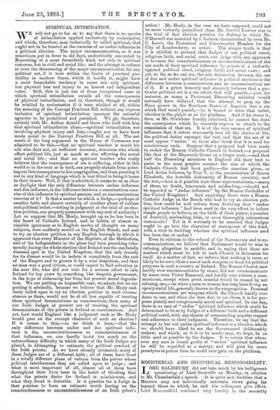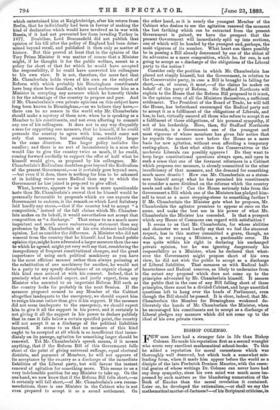MINISTERIAL AND INDIVIDUAL RESPONSIBILITY.
TORD SALISBURY did not take much by his belligerent J questioning of Lord Granville on Monday, in relation to Mr. Chamberlain's speech. It is quite new doctrine that a Minister may not individually entertain views going far beyond those to which he and his colleagues give effect. Lord Beaconsfield confessed very frankly to the assembly which entertained him at Knightsbridge, after his return from Berlin, that he individually had been in favour of making the kind of declaration which would have involved us in war with Russia, if it had not prevented her from invading Turkey in 1877. Doubtless, Lord Beaconsfield did not publish that opinion of his till after the policy of England had been deter- mined beyond recall, and published it then only as matter of history. But this proved at least that in the opinion of the Tory Prime Minister it was matter of course that a Minister might, if he thought it for the public welfare, assent to a policy far short of that for which he would have accepted the responsibility, if he could have converted his colleagues to his own view. It is not, therefore, the mere fact that Mr. Chamberlain holds views of his own on the subject of Reform with which probably his Birmingham constituents have long since been familiar, which need embarrass him as a Minister in accepting any measure which he honestly thinks it for the advantage of the country to propose and pass. And if Mr. Chamberlain's own private opinions on this subject have long been known in Birmingham,—as we believe they have,— there can be no reason in the world why Mr. Chamberlain should make a mystery of them now, when he is speaking as a Member to his constituents, and not even affecting to commit any one of his colleagues. It does not in any way disqualify a man for supporting one measure, that he himself, if he could persuade the country to agree with him, would carry not only that measure, but something considerably larger in the same direction. The larger policy includes the smaller ; and there is no sort of inconsistency in a man who would like to give the country twice as much, if he could, coming forward cordially to support the offer of half what he himself would give, as proposed by his colleagues. Mr. Chamberlain's Radicalism doubtless goes beyond the Radicalism of the present Government,—as it certainly goes beyond ours, —but even if it does, there is nothing for him to be ashamed of in holding views more Radical than any to which the Government he has joined is prepared to give effect.
What, however, appears to us in much more questionable taste than Mr. Chamberlain's avowal that he himself would be personally favourable to proposals which no one expects the Government to endorse, is the remark on which Lord Salisbury laid hardly any stress,—that if the country bad to accept " a composition," instead of the full claims which Mr. Chamber- lain makes on its behalf, it would nevertheless not accept that composition as " a discharge." That seems to us a much more important and much more embarrassing statement than any profession by Mr. Chamberlain of his own abstract individual opinion. Let us consider the difference. A Minister who did not conceal from the country that he himself, had he found public opinion ripe, might have advocated a larger measure than the one to which he agreed, might yet very well say that, considering the inexpediency of frequent constitutional changes, and the great importance of using such political machinery as you have in the most efficient manner rather than always pottering at the substitution of one machinery for another, he would not be a party to any speedy disturbance of an organic change of this kind once arrived at with his consent.. Indeed, that is precisely what we should expect, and justly expect, from any Minister who assented to an important Reform Bill such as the country looks for probably in the next Session. If the measure proposed seemed to any Member of the Cabinet altogether inadequate to the emergency, we should expect him to resign his seat rather than give it his support. If the measure did not seem inadequate to the emergency, we should expect him to give it all the support in his power, and it certainly is not giving it all the support in his power to declare publicly that in case it falls below a certain specified point, the country will not accept it as a discharge of the political liabilities incurred. It seems to us that no measure of this kind ought to be accepted at all which is so insufficient that imme- diately on its passage, agitation for something larger should be renewed. Yet Mr. Chamberlain's speech means, if it means anything, that if the Reform Bill of this Government falls short of the point of giving universal suffrage, equal electoral districts, and payment of Members, he will not approve of ha acceptance by the country as a discharge of the immediate liabilities of the Liberal party, but will favour the instant renewal of agitation for something more. This seems to us a very indefensible position for any Minister to take up. On the one hand, we now know that if the Reform Bill falls short,—as it certainly will fall short,—of Mr. Chamberlain's own recom- mendations, there is one Minister in the Cabinet who is not even prepared to accept it as a sound settlement. On
the other hand, as it is nearly the youngest Member of the Cabinet who desires to see the agitation renewed the moment the last farthing which can be extracted from the present Government is gained, we have the prospect that the present Government will immediately split up into sections, one of which will be headed by the youngest and, perhaps, the most vigorous of its number. What heart can there possibly be in passing a Bill already denounced by one of the ablest of its advocates as a mere composition, which he, for one, is not going to accept as a discharge of the obligations of the Liberal party to the nation
Consider only the position in which Mr. Chamberlain has placed not simply himself, but the Government, in relation to the Conservative party, in case a Bill is brought in falling far short,—as, of course, it must,—of the claims he makes on behalf of the party of Reform. Sir Stafford Northcote will explain to the House that the Reform Bill proposed to it is not, in the opinion even of all the Ministers themselves, a sufficient settlement. The President of the Board of Trade, he will tell the House, has beforehand encouraged the Radical party not to accept it as a fulfilment of the obligations of Liberals, and has, in fact, virtually assured all those who refuse to accept it as a fulfilment of those obligations, of his personal sympathy, if not of his leadership. Here, then, Sir Stafford Northcote will remark, is a Government one of the youngest and most vigorous of whose members has given fair notice that he regards the measure now before the House as a mere basis for new agitation, without even affording a temporary resting-place. Is that what either the Conservatives or the moderate Liberals can possibly approve ? Do they want to keep large constitutional questions always open, and open in such a sense that one of the foremost reformers in a Cabinet which proposes one measure, is already committed to the utter insufficiency of that measure, and the demand for something much more drastic ? How can Mr. Chamberlain as a states- man himself accept what he has promised his constituents to consider a mere dividend on the reforms which the country needs and asks for ? Can the House seriously take from the Government a Bill which one of the Ministers has pledged him- self to treat as a mere stepping-stone to something further ? If Mr. Chamberlain the Minister gets what he proposes, Mr. Chamberlain the agitator promises to appear at once on the scene, and make the best use in his power of what Mr. Chamberlain the Minister has conceded. Is that a prospect which any House of Commons can regard with satisfaction ?
It seems to us that Mr. Chamberlain, for whose abilities and character we need hardly say that we feel the sincerest respect, has in this matter committed a grave, though, no doubt, in so young a Minister, a pardonable error. He was quite within his right in declaring his unchanged private opinion, but he was ignoring dangerously his responsibility as a Minister, when he declared that what- ever the Government might propose short of his own view, he did not wish the public to accept as a discharge of Liberal liabilities. That menaces us with Radical half- heartedness and Radical reserves, as likely to undermine from the outset any proposal which does not come up to the principles advocated by Mr. Chamberlain himself. It assures the public that in the case of any Bill falling short of these principles, there must be a divided Cabinet, and large unsettled questions left to hang over the heads of Parliament, even though the Bill should be passed. It is clear, indeed, that Mr. Chamberlain the Member for Birmingham weakened de- liberately the hands of Mr. Chamberlain the Minister, when he encouraged his constituents not to accept as a discharge of Liberal pledges any measure which did not come up to the ideal of his own private views.



































 Previous page
Previous page